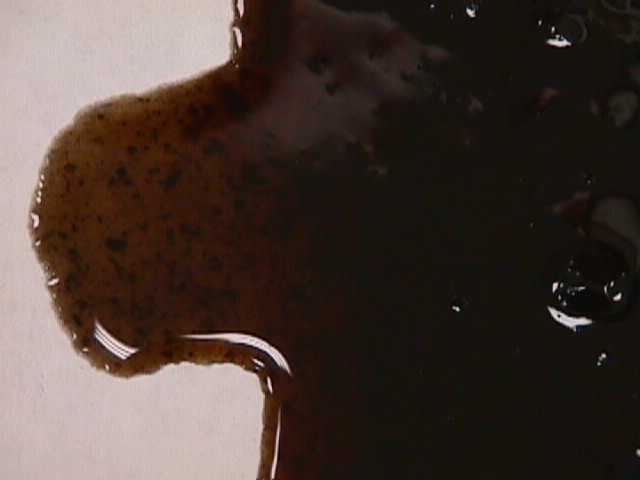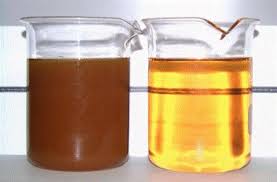

Cleanse-Oil
Tel: 01566783000 Email: info@cleanse-oil.co.uk
CLEANER OIL BRIGHTER FUTURE
PATENTED PARTICULATE REMOVAL SYSTEM PRODUCING THE WORLDS CLEANEST OIL IN A SINGLE PASS
Explanations & Examples


ISO Codes Explained
ISO 4406:1999 The international stands for oil establishes the relationship between particle counts and cleanliness in hydraulic fluids. (This has been extended to other lubricants as well). It is a myth thinking that new oil is clean oil.ISO 4406:1999 is a standard code system to quantify the contaminant particle levels measured in Micrometers (µm) The table below illustrates the relationship between ISO code and the number of particles per 1ml of fluid. (You may also find the ISO standard calls the code “scale numbers or range numbers” they could also be represented as R4/R6R14.)The ISO standard allows you to determine the current particulate cleanliness of your fluids allowing for targets to be set for the cleanup. ISO 4404:1999 provides a 3 part code to represent the total number of particulates in 1ml of fluid greater than 4 µm,6 µm and 14 µm respectively. Notice that in each step is a double or half the particle count is relative to an adjacent code. For example, Referring to the table below an ISO code of 14/12/9 would be explained as: 14 (80-160 particulates greater than or equal to 4 µm) 12 (20-40 particulates greater than or equal to 6 µm) 9 (2.5-5 particles greater than or equal to 9 µm)
How big particles are we dealing with? 1 µm equals 0.001mm. the diameter of a human hair ranges from 40-150 µm particle’s with a size of 1 µm in size would be suspended in the air.
|
ISO code |
Minimum |
Maximum |
|
1 |
0.01 |
0.02 |
|
2 |
0.02 |
0.04 |
|
3 |
0.04 |
0.08 |
|
4 |
0.08 |
0.16 |
|
5 |
0.16 |
0.32 |
|
6 |
0.32 |
0.64 |
|
7 |
0.64 |
1.3 |
|
8 |
1.3 |
2.5 |
|
9 |
2.5 |
5 |
|
10 |
5 |
10 |
|
11 |
10 |
20 |
|
12 |
20 |
40 |
|
13 |
40 |
80 |
|
14 |
80 |
160 |
|
15 |
160 |
320 |
|
16 |
320 |
640 |
|
17 |
640 |
1300 |
|
18 |
1300 |
2500 |
|
19 |
2500 |
5000 |
|
20 |
5000 |
10000 |
|
21 |
10000 |
20000 |
|
22 |
20000 |
40000 |
|
23 |
40000 |
80000 |
|
24 |
80000 |
160000 |
|
25 |
160000 |
320000 |
|
26 |
320000 |
640000 |
|
27 |
640000 |
1300000 |
|
28 |
1300000 |
2500000 |
New oil was passed through the patented Cleanse-oil particulate removal device fitted in the TR 02bc and an oil sample was taken, with the results below:-
Data Report
Sample # Sample Date & Time 21/03/2014 14:34:03
Volume 5.0 Millilitre
Flow Rate 10.0 Millilitre/min
DC Light 7.9341Volts
Counts per Millilitre
Channel Size Cumulative Data Differential Data Status
2.0000 PASS 203.4000 61.4000
2.5000 PASS 142.0000 34.6000
3.0000 PASS 107.4000 19.4000
3.5000 PASS 88.0000 17.0000
4.0000 PASS 71.0000 18.4000
5.0000 PASS 52.6000 16.4000
7.0000 PASS 36.2000 21.8000
10.0000 PASS 14.4000 12.0000
15.0000 PASS 2.4000 1.4000
20.0000 PASS 1.0000 0.2000
30.0000 PASS 0.8000 0.8000
50.0000 PASS 0.0000 0.0000
90.0000 PASS 0.0000 0.0000
100.0000 PASS 0.0000 0.0000
125.0000 PASS 0.0000 0.0000
These cleaned oil particulate counts were obtained after just a SINGLE PASS and shows that the oil was cleaned to a higher and better cleanliness required by high precision servo systems and components, which have a recommended target cleanliness of ISO 14:12:9. The TR 02bc cleaning the oil to ISO 13:12:8 in just the single pass, thereby reducing 1000 particles to better than 32. Below is a table that shows the particulates in 10 litres of new oil and the same oil after being passed through our particulate removal device, as an example of its effectiveness.
Particulate Size New Oil Oil Thro’TR 02
(18:16:13) (13:12:08)
>4 Micron/ 10 Litre 25,000,000 800,000
>6 Micron/ 10 Litre 6,400,000 400,000
>14 Micron/ 10 Litre 800,000 25,000